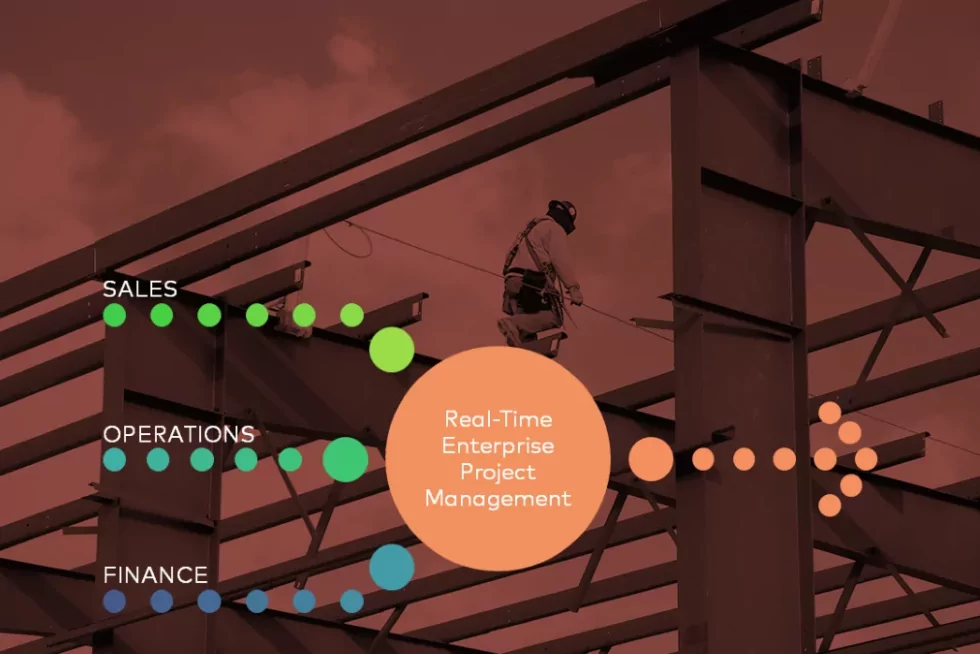
Continuing our McKinsey & Co. blog series on how to build better megaprojects, I’m going to delve into another reason the construction industry often fails to bring projects in on time and on budget: flawed performance management.
All too often, construction firms run their business units and projects as if they were independent entities, without consistent performance management, according to McKinsey. This leads to the common and dreaded “silo effect”.
Companies that don’t standardize their operations and their project reporting across the enterprise aren’t able to manage their risks as well as they could. Moreover, they cannot apply the best practices discovered from one project to future projects. If you cannot measure performance, you cannot improve it.
For an enterprise, the best way to standardize processes across the organization is through a construction ERP.
LEARN FROM PAST PROJECTS
While it’s true that each project is different, you must still learn from past experiences. Failing to gain insight from past projects is one reason the industry has been slow to adopt new technologies and techniques, unlike firms in other sectors.
Other industries use digital innovations to find better ways to manage their projects and improve productivity far better than construction, according to McKinsey.
The problem is that most construction companies typically have separate systems and databases for each stage of their projects – planning, design, procurement and construction. This disjointed structure not only causes delays, but also hinders insight. It’s crucially important that you standardize your systems and processes to ensure that each project is able to make the best use of the best features from previous projects.
DISJOINTED SYSTEMS NOT ONLY CAUSE DELAYS BUT ALSO HINDER INSIGHT.
That’s why it’s critical for you to have a single database where you can store the most important metrics, such as the progress of construction on every project and real unit costs, McKinsey noted.
STANDARDIZE SYSTEMS TO BOOST PRODUCTIVITY
Another key to effective project management is good communication at every phase of a project. Although there are any number of companies that offer solutions to help improve communication, many executives, project managers and others in construction firms just aren’t good communicators, and those systems can’t make a person a better communicator. That is why standardization is vital for good communication, because the system requires it.
To ensure your projects are properly managed, you need to establish a flow of communication between all stakeholders – a standardized system that gives everyone access to pertinent project and portfolio information in real time. This will allow you to automatically identify potential issues before they become problems on the jobsite.
ADOPT FORMALIZED PROCESSES TO MINIMIZE RISK AND ENSURE PROFITABILITY.
In order to establish effective communication flows, you must first adopt formalized workflows and processes in conjunction with seamless software solutions. Standardizing processes will enable you to automatically gain insight into portfolio performance that will help improve productivity, efficiency and accuracy. Without standardizing your project processes, you cannot rely on the data you receive. Consistent processes produce reliable and timely data upon which you can make well-conceived decisions.
Processes aren’t worth much if they can’t be repeated. Repeatable processes allow you to measure activity, glean insights in real time based on those measurements and make improvements so your company can become more profitable.
ERP RECONSTRUCTED
At ADEACA, we have spent the last 10 years working with our customers to develop and refine the best project management practices and integrate them into one holistic solution for project-based industries, such as construction. In order to create a real-time system for projects, we first had to create processes with the capability to deliver accurate real-time workflows. ADEACA ONE systematizes these integrated processes, providing a structure that organizes your entire business. The result is that every part of your organization is aligned and information is both reliable and timely.
LEARN MORE ABOUT HOW ADEACA ONE WAS CREATED >
In today’s increasingly complex project environments, businesses are facing unprecedented challenges in delivering projects on time, within budget, and according…
Project Business Transformation reduces risk, increases efficiency, and enhances decision-making in your project organization. Project Business Automation is a new…
Project Business Transformation is a strategic digital transformation initiative designed to fundamentally change how projects are managed and delivered in…
There is so much hype around the use of AI in project management. What is the reality? Join Chief Category…
In the dynamic landscape of project-driven enterprises, risk is omnipresent. As projects become integral components of your business strategy, the…
Management by exception is a method of business management that focuses on identifying and managing cases that deviate from the…
This website uses cookies.